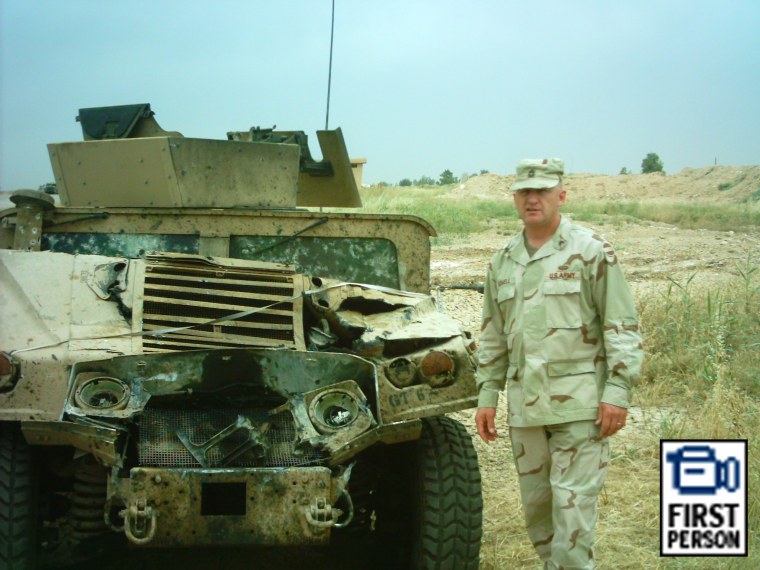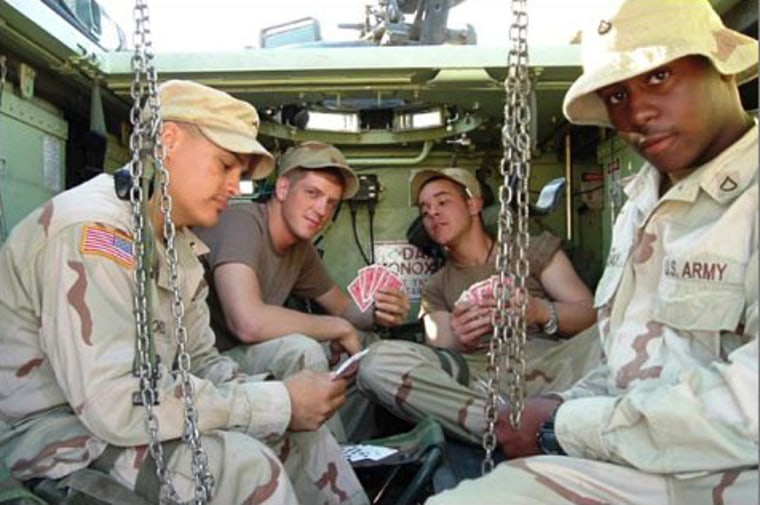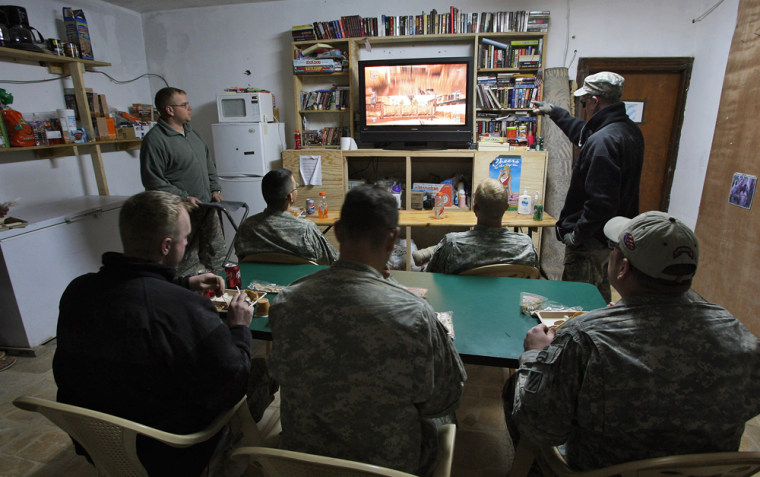In April, Army 1st Sgt. James Rowell will ship out for his third tour in Iraq. And in his Tuff Box, along with his other necessities, he’ll pack his Xbox 360, his “Halo” games and his “Call of Duty 4,” a military shooter.
“We take our gear down range – down range means deployed — and we have a lot of fun on our off-time,” says Rowell, who lives in Olympia, Wash. “It really does help out the esprit de corps, and the morale of the enlisted personnel — and all personnel.”
Rowell recalls with relish a time that he played a superior officer in “Halo 2.”
“I beat the crap out of him so bad, that he actually threw the controller out of his hands onto the ground, and walked away and wouldn’t talk to me for two days,” he says with a chuckle. “That’s how intense it is.”
Real life is intense in Iraq, too. With danger and death a constant threat, it can feel pretty satisfying to curl up with the controller for a few hours and blast some aliens in “Halo 2.” Or run some plays in “Madden” on the PlayStation 2.
“If ever there was a therapeutic use of video games it is with those ‘down range’ who go ‘outside the wire’ in combat,” says Charles Figley, professor and director of the Psychological Stress Research Program at Florida State University. “Yes, indeed, video games are a way of calibrating and managing the overwhelming pulses of stress that comes with combat zone living.”

It’s not often that video games get kudos from psychologists. More often, you hear cautions from mental health professionals about gamers who become addicted or socially isolated. And of course, there’s that nagging video-games-and-violence thing.
Thomas Kolditz, an army colonel and professor at the U.S. Military Academy in West Point, says he’s familiar with the literature on video games and violence, but he doesn’t think it’s relevant when it comes to soldiers in combat.
“I don't believe there are aggression issues with soldiers who play those games because they have a well-developed understanding of the nature of violence in reality,” says Kolditz, who heads up West Point’s Department of Behavioral Sciences and Leadership. “They are different than children or even civilians in that respect.”
And even though real life in Iraq can be dangerous, it can also be pretty darned boring. Video games are a great way to break the monotony and pass the time.
Matt King, a medic in the Army, was stationed in Ramadi for a year. He was part of a quick-response unit, which was often on call 24 hours a day, seven days a week.
“A lot of the time, you were just sitting around, waiting and waiting,” he says. “You had to fill that time with something … there was a lot of time to fill.”
King says he and the guys in his unit played “Madden” and “Tiger Woods Golf” when they weren’t on patrol or responding to calls. But the runaway favorite, the game he says his unit played 90 percent of the time? “Halo 2.”

King says that games really helped to build friendships between the guys in the unit. Your buddy might not be able to convince you to forego Snoop-Dogg in favor of Alan Jackson, or watch “The Simpsons” if you’re a “CSI” fan. But everyone’s played video games at one point. It’s a great common denominator.
But King says it was unsettling to think that the guy you’ve played “Halo 2” with for a year might not be there tomorrow.
“It’s weird to play a game with someone one day, and they could be killed or not be there the next day,” he says. “You never look forward to what might happen … you can’t do that. “
King was injured twice while in Iraq, and received two Purple Hearts. He took a piece of shrapnel from an incoming rocket, which he says “was the one thing that would shut down the gaming systems.”
The second injury, from a roadside bomb that exploded beneath his truck, found him medi-vacced to Balad Air Force Base. He remembers that the base had everything – a pool, Starbucks, Burger King, a bus system and a rec room with everything from ping pong to video games.
“They really, really had it good,” he says. “There are a lot of guys in outposts that would love to get their hands on something that would occupy their time.”
